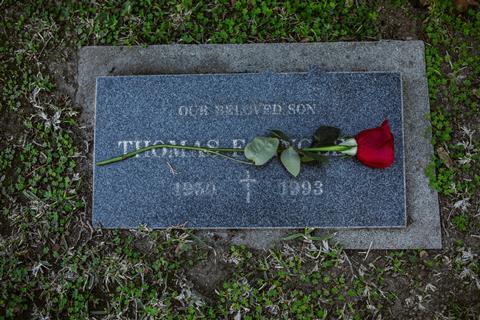The death of a someone close to you is a deeply painful time. When they don’t have a Christian faith, or we don’t know what they believe, it can be even more difficult. Will Dobbie recounts his own experience and offers some hope

We first met when he was posted to my army unit in Germany. I had been feeling homesick and isolated as a Christian, and he extended friendship to me. We would go running together and drive around Europe on weekends. He became my best friend. One weekend, we were staying in a hostel in Berlin. As we lay on rickety beds in the dark, I shared the gospel with him. He was polite but non-committal.
Another time, we went to Amsterdam to meet my girlfriend and buy an engagement ring for his. A few months later, I played the organ at his wedding. He asked for ‘There may be trouble ahead’ as he and his bride walked up the aisle, to gales of laughter from the congregation.
Soon afterwards, we were posted to Iraq. In different units, our paths hardly crossed but, one evening, when the sand and dust had made for yet another achingly beautiful sunset, I passed him during a run around the base and we had a joyful catch-up.
The truth is that we will not always understand God’s purposes
A few days later, I was commanding the Quick Reaction Force when we were scrambled to respond to an incident. As we left the base, more information came in, including the ‘zap’ numbers of the casualties involved. A zap number is the first two initials of a soldier’s name, followed by the last four digits of their army number and their blood group. I spent the 20-minute journey trying to work out who the casualties were.
By the time we arrived, I was satisfied that I didn’t know the victims personally. But I was wrong. A huge roadside bomb had crushed my friend’s vehicle, obliterating him and his driver.
In the months that followed, I agonised over the ways in which I had (and hadn’t) witnessed to him. I writhed as I replayed his reactions to my imperfect expressions of the gospel. Now it was too late.
Just months after playing the organ at his wedding, I was playing the keyboard at his memorial service. I found no comfort in the verses of scripture read out during the ceremony as I reflected that, as far as the evidence pointed, they didn’t apply to him. My friend had perished.
The heartbreaking taboo
When an unsaved loved one dies, it is surely one of the most heartbreaking circumstances. Yet it is something most Christian’s experience – and find impossibly hard to talk about. But if you are struggling with the loss of a loved one and the doctrine of hell, there is no shame in that. You are in good company.
A pastor friend of mine was once called upon to visit a couple. Their son who did not, as far as they knew, have a faith, had just completed suicide. My friend is as theologically astute as anyone I know, a seasoned pastor who has authored Christian books. Yet he had literally no idea what to say as he approached their front door.
When an unsaved loved one dies, it is surely one of the most heartbreaking circumstances
In the aftermath of devastating suffering - which included the violent deaths of children whose spiritual status troubled him - Job cries out: “I loathe my life…I will speak in the bitterness of my soul. I will say to God, ‘Do not condemn me; let me know why you contend against me. Does it seem good to you to oppress, to despise the work of your hands?’” (Job 10:3).
Yet as Job flails in the darkness with this bewildering grief, God commends Job and instead rebukes the friends who corrected him: “My anger burns against you [Eliphaz] and against your two friends, for you have not spoken of me what is right, as my servant Job has” (Job 42:7, emphasis mine).
No sin
This indicates that not only is there no shame in struggling to accept God’s actions, there is no sin either – as long as, like Job, we cling onto a right understanding of God.
So what was it that Job voiced correctly about God? Just a few verses earlier, he says: “I know that you can do all things, and that no purpose of yours can be thwarted…Therefore I have uttered what I did not understand, things too wonderful for me, which I did not know” (Job 42:2–3).
The truth is that we will not always understand God’s purposes. As Job admits elsewhere, we observe “but the outskirts of his ways” (Job 26:14). God says in Isaiah 55:9: “As the heavens are higher than the earth, so are my ways higher than your ways and my thoughts than your thoughts.” God calls us to trust, humbly, that he is working in ways mysterious to us.
Truth and comfort
Yet the loss of an unbelieving loved one can, of course, make us re-evaluate our theology. How loving and compassionate is God really? Is he a God that I’m able to keep following without resentment? What about predestination? What about babies? What about the severely disabled? And if the person I loved is now in hell, how can I have any consolation, any closure, any peace, ever again?
God’s word has deep, rich answers to these questions. And so it’s vital for us to study what scripture says about his judgement honestly and clearly. I trust you will discover that more clarity leads to more comfort, not less.
In the words of CS Lewis: “comfort is the one thing you cannot get by looking for it. If you look for truth, you may find comfort in the end: if you look for comfort you will not get neither comfort or truth – only…wishful thinking…and, in the end, despair”.
May you experience unexpected comfort and solace as you mine God’s word for his truth.
A Time to Mourn: Grieving the loss of those whose eternities were uncertain by Will Dobbie (Christian Focus) is available now



































7 Readers' comments